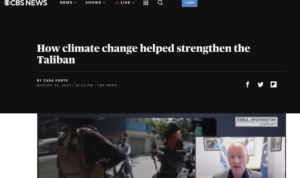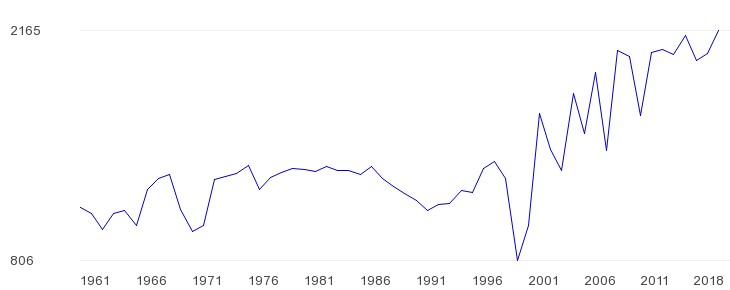Aug. 21, 2021 – 2:32 – Climate Depot founder reacts to a CBS report saying climate change helped strengthen the Taliban

CBS News: “Rural Afghanistan has been rocked by climate change. The past three decades have brought floods and drought that have destroyed crops and left people hungry. And the Taliban — likely without knowing climate change was the cause — has taken advantage of that pain.” … “The Taliban has capitalized on the agricultural stress and distrust in government to recruit supporters. Alam said the group has the means to pay fighters more, $5-$10 per day, than what they can make farming.” …”With poverty and war and everything else, climate change is the last thing on anyone’s mind,” said Alam.
“Climate change has fueled terrorism and civil unrest elsewhere in the world. Boko Haram gripped water-scarce central Africa in 2017 as they gained footholds along the Lake Chad Basin. ISIS has taken advantage of agrarian communities suffering from extreme drought in Iraq and Syria.”
#
Reality Check: Greenpeace Co-Founder Dr. Patrick Moore rips CBS News, tells Climate Depot: “It’s like there is a contest to invent the most implausible fabrication about the climate. At a certain point, it becomes too silly to even bother trying to counter it with reason. Could that be their ambition, to get away with being uncontested?”
James Taylor refutes CBS News with crop yield data: “As you can see, however, Afghanistan has fully doubled its crop yields during the past three decades. Also, Afghan farmers have set new production records on a regular basis, especially during the past few years. … If global warming has had any impact on Afghan farmer sentiment throughout the country, it has clearly been to make farmers happier, more prosperous, and less vulnerable to the Taliban.”

Related; The climate activists and media tried this climate link with Syria. See: Flashback: 2013 conflict in Syria blamed on drought caused by global warming — Flashback 1933: ‘YO-YO BANNED IN SYRIA – Blamed For Drought By Moslems’ – Real Science reaction: ‘In 1933, drought was blamed on Yo-Yos. Eighty years later, modern Yo-Yos blame drought on CO2’ Latest science refutes global warming/drought claims: Globally, ‘there has been little change in drought over the past 60 years.’
2021: UN & Google Blame Global Warming for African Dictatorships’ Failures
By: Marc Morano – Climate DepotAugust 20, 2021 12:56 PM with 0 comments
https://www.cbsnews.com/news/climate-change-taliban-strengthen/
BY CARA KORTE
Rural Afghanistan has been rocked by climate change. The past three decades have brought floods and drought that have destroyed crops and left people hungry. And the Taliban — likely without knowing climate change was the cause — has taken advantage of that pain.
The ripples of these climate-spurned Afghans can last for years. Farajalla said farmers who abandon their land often leave their families behind, arguably making those children easier recruiting targets for extremism.
Climate change has fueled terrorism and civil unrest elsewhere in the world. Boko Haram gripped water-scarce central Africa in 2017 as they gained footholds along the Lake Chad Basin. ISIS has taken advantage of agrarian communities suffering from extreme drought in Iraq and Syria. Farajalla said arid or semi-arid areas in impoverished countries with low levels of education and poor infrastructure are all ripe for extremism.
The Taliban has not only used farmers and rural communities to fortify their ranks, but also to help fund their efforts by taxing farmers on their territory. Most crucially, they have controlled the uber-lucrative poppy trade in Afghanistan.
The country is the world’s leading supplier of opium poppies. Not only has the Taliban made billions from their illicit drug trade, but poppies require less water than other crops, providing more stable means to struggling farming communities. Poppy cultivation is most abundant in the south of the country, where drought in part fueled by climate change has been the most severe and the Taliban is most popular.
These partnerships have helped the Taliban’s popularity. But since taking control of the country, the group has vowed to make the nation poppy-free — a tenuous political decision that would not be popular with the rural communities that rely on the crop, said Vanda Felbab-Brown, director of the Initiative on Nonstate Armed Actors and a senior fellow at the Brookings Institution.
“If they went to go for the ban quickly, they would cause themselves a huge economic downturn. They would set off massive miseration of the population. And they would have real problems with maintaining stability,” she said.
“Their own fighters often harvest poppy. For many of the fighters, poppy was the principal source to help them fund their family and themselves. They could do jihad for months but would have to disengage to harvest so the family had food.”





